Samsung Literally Stole Apple’s Face ID Logo for Its New ‘Samsung Pass’
 Credit: WCCFTech
Credit: WCCFTechToggle Dark Mode
Samsung is well-known for “borrowing” ideas from other tech firms, particularly Apple. And at CES this year, it seems like the South Korean company is at it again.
HS Kim, Samsung’s CEO and president of Consumer Electronics, announced a new security authentication and password management feature called Samsung Pass onstage at CES today.
But while he was announcing it, some suspiciously familiar icons were displayed on the wall behind him.
Right in-between an iris and a heart icon is what looks to be Apple’s Face ID logo. And it doesn’t look “inspired” by Face ID the same way as the Touch ID-esque fingerprint logo to the right of it. It’s just straight up the Face ID logo.
There doesn’t appear to be any justifiable explanation for it, either. Samsung Pass doesn’t support Apple’s Face ID and it isn’t coming to iOS anytime soon.
With all of that in mind, it looks like one of Samsung’s designers took a bit too much inspiration from the Face ID logo.
The Face ID logo isn’t a generic icon, either. Its history at Apple actually stretches back to the original smiling Mac icon that was first drawn in 1997 by Susan Kare. The smiling face can also be seen in the macOS Finder app today.
And Apple didn’t make the Face ID logo freely available for reuse. In fact, the Cupertino tech giant has already trademarked it.
The weird part is that Samsung already has distinct facial recognition and fingerprint authentication logos for its smartphones. So why didn’t it just use those onstage?
There are honestly more questions than answers here. But for a company that literally circulated an internal document detailing ways to make a Galaxy more like an iPhone, it isn’t all that unexpected.
Samsung has made other questionable copying moves in the past, too. It’s reused DSLR photographs as examples of its camera prowess and nearly partnered with an illegitimate Supreme knockoff brand.
It’s worth noting that Apple itself is a frequent target for imitation by other brands too. Just consider Android P’s gesture controls, Xiaomi’s ‘Mimoji,’ or the wave of notch-sporting Android devices that surfaced after the iPhone X.







